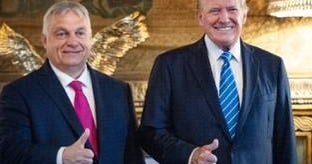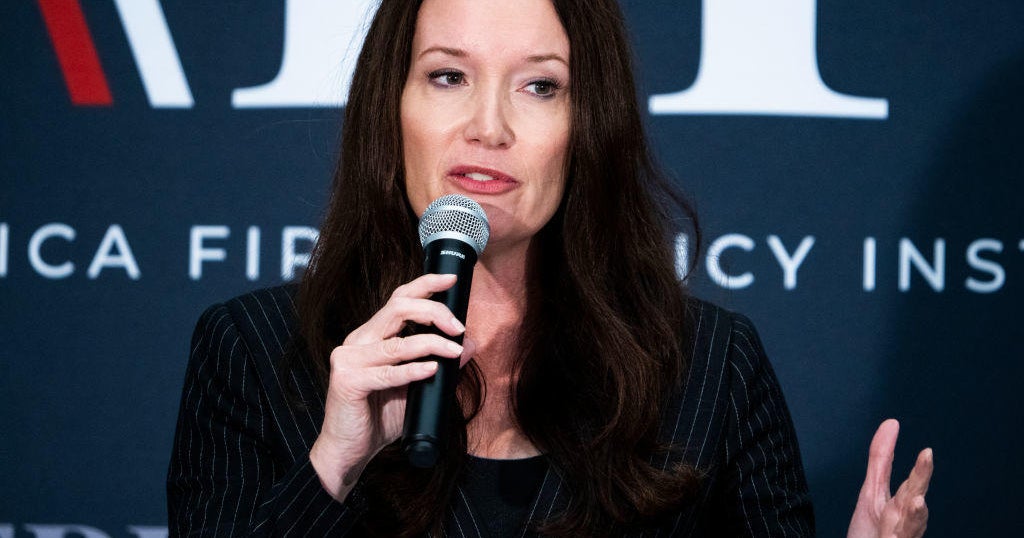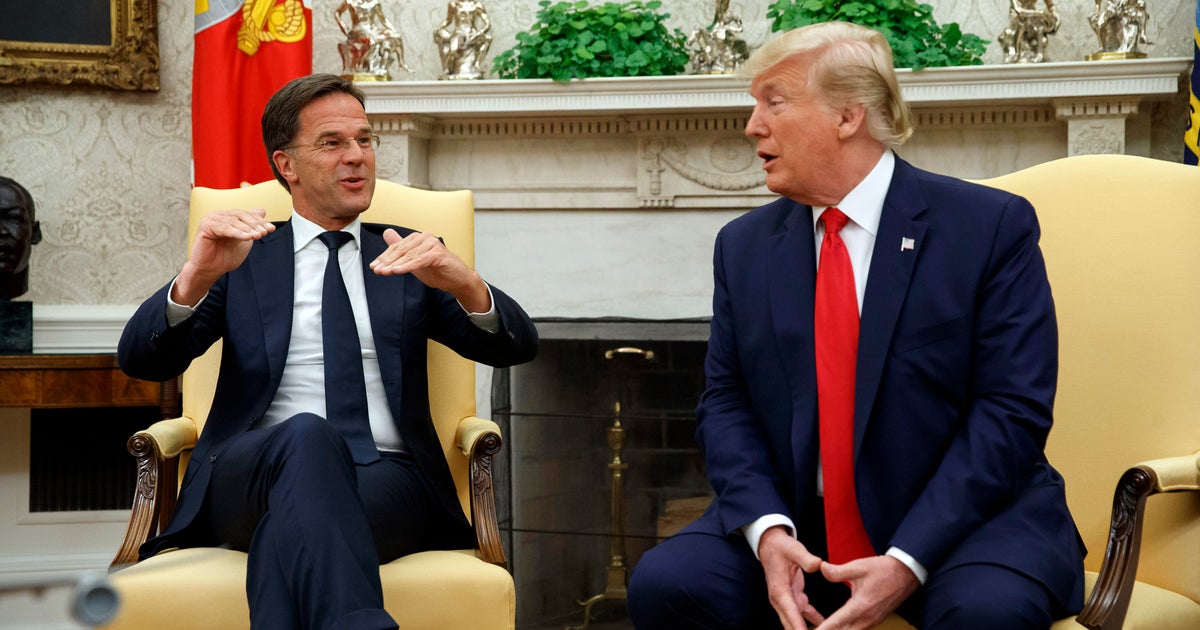CBS News
Hungary’s far right Prime Minister Viktor Orbán visits Trump in Mar-a-Lago after NATO summit

Hungary’s nationalist prime minister, Viktor Orbán, traveled to Florida on Thursday and met with former President Donald Trump following a NATO summit in Washington, a move likely to aggravate frustrations among Western allies over similar secretive trips he made to Russia and China in recent days.
Orbán met with Trump at the former president’s beachside compound Mar-a-Lago and shared a photo of the two on social media with the caption: “We discussed ways to make peace. The good news of the day: he’s going to solve it!”
On his own social media site, Trump posted: “Thank you Viktor. There must be PEACE, and quickly.”
The Hungarian leader has openly endorsed Trump’s candidacy in this year’s presidential election and expressed hopes that the Republican will be able to bring an end to Russia’s war in Ukraine.
The European Union’s longest-serving leader has become an icon to some conservative populists for championing what he calls “illiberal democracy,” which includes restrictions on immigration and LGBTQ+ rights. He has also cracked down on the press and judiciary in Hungary and been accused by the EU of violating rule-of-law and democracy standards.
The Mar-a-Lago meeting – Orbán’s second since March – came as the latest stop on what he calls a “peace mission” aimed at finding a path toward ending Russia’s war in Ukraine.
Widely considered to have the warmest relations with the Kremlin among all EU leaders, Orbán made an unannounced visit last week to Kyiv, where he held talks with Ukrainian President Volodymyr Zelenskyy.
Some of his critics interpreted the Kyiv visit as a sign that Hungary could take steps closer to the EU mainstream’s pro-Ukraine stance as it took over the bloc’s six-month rotating presidency earlier this month.
But those hopes were dashed when he made an unannounced trip to Moscow days later to meet with Russian President Vladimir Putin, a rare trip to Russia by a European leader that drew condemnation from Kyiv and other European capitals.
After that, he flew to Beijing to meet with Chinese President Xi Jinping, where he described China as a stabilizing force amid global turbulence and praised its “constructive and important” peace initiatives.
Zelenskyy said that when Orbán visited Kyiv, he didn’t know that the Hungarian leader would also travel to Moscow.
“Where he will go tomorrow? I don’t know. I don’t know. Maybe he will come again to Ukraine,” said Zelenskyy told reporters at the NATO summit in Washington.
NATO Secretary-General Jens Stoltenberg added that it wasn’t up to the military alliance to decide whom member countries meet with.
“What matters for NATO is that all NATO allies agree on the policy. And we have yesterday agreed a very strong declaration from the 32 allies expressing our support to Ukraine,” Stoltenberg said Thursday.
Speaking as he arrived at the NATO summit Thursday, Finnish President Alexander Stubb rebuked Orbán for his visits to Moscow and Beijing, which EU leaders have rushed to clarify were not endorsed by other European leaders.
“I’ll say it out loud, I don’t think there’s any point in having conversations with authoritarian regimes that are violating international law,” Stubb said. “He can do it on his own behalf. But I fundamentally disagree about doing that. I simply do not see the purpose.”
President Biden, speaking at a news conference after the NATO summit, said he has “no good reason to talk to Putin right now — there’s not much that he is prepared to do in terms of accommodating any change in his behavior.”
Orbán seemed isolated at the summit in Washington and hardly spoke to reporters, Agence France-Presse noted.
Orbán has sought close ties to Trump and other conservative Republicans and expressed his belief that a new Trump presidency was the “only serious chance” for an end to the war in Ukraine.
Trump has repeatedly said he could settle the war “in 24 hours” if he’s elected president again by meeting with both Putin and Zelenskyy – a claim Russia’s United Nations ambassador has disputed.
White House national security adviser Jake Sullivan on Thursday signaled concern that a Trump-Orbán meeting would run counter to Ukraine’s interests, saying, “The U.S. position – the Biden administration position – is nothing about Ukraine without Ukraine.”
“Whatever adventurism that is being undertaken without Ukraine’s consent or support, you know, is not something that’s consistent with our policy, the foreign policy of the United States,” Sullivan told reporters, adding that he “can’t speculate as to what Orbán is up to, exactly.”
Some observers have raised concerns that Orbán’s pursuit of a separate foreign policy on Russia and China than that of his EU and NATO partners threatens to undermine those groups’ unity.
European governments, meanwhile, have engaged in deep consultations on what they could do to ensure that NATO, Western support for Ukraine and the security of individual NATO countries will endure should Trump – one of the military alliance’s most prominent critics – win back the presidency in November and temper U.S. contributions.
Daniel Fried, a former longtime diplomat and expert on Eastern Europe in the U.S. government, said Orban’s links with China could be hard for Trump to defend given his own get-tough messages toward Beijing.
Otherwise, however, it’s entirely natural, and good leadership, for foreign governments to be reaching out to possible next presidents of the U.S., Fried said.
“A lot of the foreign ministers and other people are probably having side meetings with people near Trump World” on the summit sidelines, he said. “In their place, I would do the same.”
CBS News
Here Comes the Sun: Jack Antonoff and more

Watch CBS News
Be the first to know
Get browser notifications for breaking news, live events, and exclusive reporting.
CBS News
Capturing Moriah Wilson’s Killer – CBS News

Watch CBS News
Be the first to know
Get browser notifications for breaking news, live events, and exclusive reporting.
CBS News
How to watch the Minnesota Vikings vs. Chicago Bears NFL game today: Livestream options, more

Getty Images
The Minnesota Vikings will take on the Chicago Bears today. The Vikings are currently 8-2, an impressive run so far this season, and will be looking to add a fourth win to their current streak after last Sunday’s 23-13 win against the Tennessee Titans. The Bears, on the other hand, are entering this game on the heels of a four-game losing streak after a tough 20-19 loss against the Green Bay Packers last Sunday.
Here’s how and when you can watch the Vikings vs. Bears game today, whether or not you have cable.
How and when to watch the Minnesota Vikings vs. Chicago Bears
The Vikings vs. Bears game will be played on Sunday, November 24, 2024 at 1:00 p.m. ET (11:00 a.m. PT). The game will air on Fox and stream on Fubo and the platforms featured below.
How and when to watch the Minnesota Vikings vs. Chicago Bears game without cable
You can watch this week’s NFL game on Fox via several streaming services. All you need is an internet connection and one of the top options outlined below.
Fubo offers you an easy, user-friendly way to watch NFL games on CBS, Fox, NBC, ABC, ESPN, and NFL Network, plus NCAA football channels. The Pro tier includes 200+ channels and unlimited DVR, while the Elite with Sports Plus tier adds NFL RedZone and 4K resolution. New subscribers get a seven-day free trial and all plans allow streaming on up to 10 screens simultaneously.
You can watch today’s game with a subscription to Sling’s Orange + Blue tier, which includes ESPN, ABC, NBC, and Fox. The plan offers 46 channels with local NFL games, nationally broadcast games and 50 hours of DVR storage. For complete NFL coverage, add Paramount+ to get CBS games, or upgrade with the Sports Extra add-on for additional sports channels like Golf Channel, NBA TV and NFL RedZone.
Watching NFL games, including Fox broadcasts, is simple with Hulu + Live TV, which includes 90 channels, unlimited DVR storage, and access to NFL preseason games, live regular season games and studio shows. The service includes ESPN+ and Disney+ in the subscription.
Want to watch today’s game live on your smartphone? If so, NFL+ streaming service is the solution you’re looking for. It lets you watch NFL Network and out-of-market games on mobile devices, with an upgrade option to NFL+ Premium that includes NFL RedZone for watching up to eight games simultaneously. Note that NFL+ only works on phones and tablets, not TVs.









